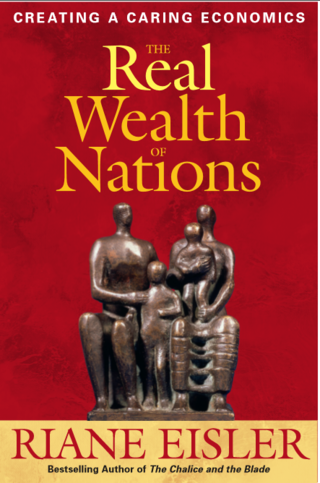Environment
Mothering Nature in the Age of Trump: Dr. Riane Eisler
End domination and authoritarianism with collaborative care, across the board.
Posted March 8, 2017
People & plans to expedite world harmony: Dr. Riane Eisler

In honor of International Women’s Day, Mothering Nature is very pleased to welcome the great Dr. Riane Eisler as the first guest in our new series: Mothering Nature in the Age of Trump. Dr. Eisler’s work for women and children around the world has changed countless lives and the fabric of international culture.
Born in Austria and galvanized by a horrific personal loss of family to authoritarian dictatorship during the Holocaust, she’s dedicated her life to a global cultural shift away from domination-based economies, towards a sustainable culture of collaboration, partnership and caring.
Her instrumental book The Chalice and The Blade, according to the LA Times, “may be the most significant work published in all our lifetimes …It may make the future possible.” Since then, she’s continued to publish groundbreaking works including The Power of Partnership, The Real Wealth of Nations and Sacred Pleasure.

She is the founder and president of The Center for Partnership Studies, and the editor-in-chief of the Interdisciplinary Journal of Partnership Studies. Dr. Eisler has received numerous honors and awards, including honorary PhDs and peace and human rights awards. She lectures worldwide, including at the United Nations General Assembly, the U.S. Department of State, Congressional briefings, universities, corporations, conference keynotes, and events hosted by heads of State.
Dr. Eisler warmly welcomes readers to join her for The Center for Partnership Leadership and Learning Programs that “bring together women and men from around the world to learn how to become leaders of the partnership and caring economy movements.”
*****
Dr. Eisler…Thank you so much for talking with us at this remarkable juncture in history. Given your vital work on collaborative and partnership societies, your perspective is increasingly significant to the world today as authoritarian power seems to be rising in the world. Your work is also pertinent to the idea of “Mothering Nature”—humans working in harmony with the natural world. Welcome!
Many people are now realizing that the connection between human harmony and the environment has been severely eroded in recent history, and that this is coming to a crisis point. Do you believe such a breakdown (e.g. climate change, species extinction, human oppression or hatred etc.) is inevitable for humans as a species? Or just a toxic cultural “mistake” that can be solved?
How can shifting our human culture to partnership and collaboration help?
RE: In our age of nuclear and biological weapons and the ever more efficient exploitation of nature, the mix of high technology and an ethos of domination could take us to an evolutionary dead end.
This is not inevitable. But averting it requires more than tinkering at the edges of failing political and economic institutions. It requires a cultural transformation.
The good news is that there is strong movement in this direction of shifting from domination systems to partnership systems. Over the past several hundred years, one progressive movement after another has challenged traditions of domination – from the 18th century “rights of man” movement challenging the “divinely ordained right” of kings to rule their “subjects” to today’s environmental movement challenging the once hallowed “conquest of nature.”
The bad news is that the movement toward the partnership side of the social scale (and it is always a matter of degree, as no society is a pure partnership or domination system) has been fiercely resisted and countered by periodic regressions. So domination systems have rebuilt themselves in different forms – be they secular or religious, eastern or western, leftist or rightist.
As I said when I spoke to the United Nations Assembly, we can’t just tack on environmental balance to a fundamentally imbalanced system. That session was organized by Bolivia. It pointed out their indigenous traditions of worshipping the Pachamama, or Great Mother, which imbued the culture with respect for nature.
We have to recognize that the rape of nature and the rape of women is of the same dominator cloth: part of an authoritarian and exploitive system of top down-rankings we have been trying to leave behind: man over man, man over woman, race over race, religion over religion, and man over nature. Preventing regressions to domination – and the destructive policies they bring – requires whole systems change that addresses connection we are not used to recognizing.
How has the recent US election and inauguration impacted your work and/or thinking? Are you taking different steps in response? If so, can you tell us about that?
RE: What happened in the US is a regression to the domination side of the social scale. Trump claimed that he, as a “strongman,” would solve all our problems, and was elected by fanning fear, hate, scapegoating, the debasement of women.
While there were many factors in the 2016 election, from false news to voter suppression and Russian hacking, the question is why so many people responded to this demagoguery. To answer this question we have to go deeper; to ask what conditions people to vote for authoritarian leaders who advocate punitive policies against weak or vulnerable “out-groups.”
Very briefly, studies show that people from authoritarian, male-dominated, punitive families tend to vote for “strongman” leaders and for “hard” punitive policies (prisons, wars) rather than “soft” caring policies (healthcare, childcare). Not everyone from this background does. But many people do. And this conditioning can be exploited, as Trump’s campaign did, especially in times like ours of economic, social, and technological upheaval.
But the ground for this election was paved for a long time. If we look at the last decades, we see that the US rightist-fundamentalist alliance demonized partnership-oriented families and painted women’s rights as a threat to “tradition” – which of course it is to traditions of domination. These people had an integrated political agenda that recognizes that a “traditional” authoritarian, male dominated, punitive family is foundational to an authoritarian, male dominated, punitive politics. We can see this connection in sharp relief in brutal top-down regimes, be they secular like Nazi Germany or religious like ISIS in the Middle East.
By contrast, for most progressives, what happens in families is a matter of “just” women’s issues and children’s issues. So progressive movements have focused primarily on dismantling the top of the dominator pyramid (politics and economics) and left its foundations (domination in family, gender, and other intimate relations) in place.
And it is on these foundations that domination systems have kept rebuilding themselves, be they eastern or western, rightist or leftist, religious or secular. We urgently need an integrated progressive political agenda, along the lines I propose in my book The Power of Partnership if we are to have foundations for a more equitable, sustainable, caring world.

As you know, I’ve written about killer whales. They’re much older in their evolution than modern day humans. They are matriarchal and have different cultures across groups. Females, like humans, have menopause which is a strategy that enables wise elder females to lead and support their families. Do you think humans can learn from killer whales as we work to transition our own culture?
RE: We can learn a great deal from whales. It is the same lesson we can learn from our close genetic relatives, the bonobo apes of the Congo. Here mothers have a great deal of authority, there is very little violence (with no signs of sexual violence against females), and their society is held together by sharing and caring rather than by fear and force.
We too can build these more partnership-oriented societies, and have done so. I write about earlier more partnership-oriented cultures where women were not barred from leadership roles, as they are in domination systems in The Chalice and The Blade and in Sacred Pleasure.
Contemporary nations such as Sweden, Norway, and Finland, where women are half of the national legislatures, also have more caring policies, less violence, and more environmentally sustainable policies. These are connections we must pay attention to if we are to build a better future for us all.
Do you think the rising empathic response globally (to the harm against killer whales, other animals, people of color, various religions, the climate, ecosystems, and planet itself) is a sign of a significant moment in human cultural evolution?
RE: Yes, all these are signs of movement toward a partnership system where – beginning with the basic difference in our species between male and female – difference is not equated with superiority or inferiority, dominating or being dominated, being served or serving.
We humans are wired for empathy by evolution, but when children grow up in dominator families they internalize this male over female template for relations early on. They then automatically apply it to other differences, whether based on race, religion, sexual orientation, and so forth.
It is not coincidental, for example, that for so-called religious fundamentalists – whether they are Western or Eastern, Muslim or Christian – rigid male dominance and “holy wars” are priorities. Or that competing sects of the same religion, such as Sunni and Shia, are at each other’s throats. In these cultures, women are rigidly controlled by men. Indeed, for Islamic fundamentalists male “honor” is equated with control over the women in a man’s family – to the extent that killing a woman who makes her own sexual choices (like marrying without her father’s consent) is considered honorable, rather than criminal.
We have to understand these dynamics and support the women and men in all world regions working to leave behind traditions of domination – in both intimate and international relations.
What would you say to young people, in particular now? Women? Men?
RE: Many young people are hungry for new thinking. So I invite them to use the tools and other resources we have developed to accelerate the shift from domination to partnership.
An area of particular importance is economics. Neither capitalism nor socialism is capable of meeting our unprecedented global challenges. Both came out of early industrial times, and we are now well into the post-industrial age. Both came out of times when the West still oriented much more to the domination side of the social scale, so both these theories did not pay attention to caring for people and nature. For both Adam Smith and Karl Marx the essential work of caring for people, starting in early childhood, was “just women’s work” – and in their minds not even classified as “productive work.”

One resource is my book The Real Wealth of Nations: Creating a Caring Economics, which inspired the Center for Partnership Studies’ Caring Economy Campaign or CEC. We offer webinars for change agents (Leadership and Learning Programs) and developed Social Wealth Economic Indicators, new metrics that demonstrate the enormous economic value of the work of caring for people, starting in early childhood, and caring for nature.
If we are serious about breaking cycles of poverty, we have to change this (economy). Care work is still primarily done by women for free in families and for poverty wages in the market, and this is a major reason that worldwide women are the mass of the poor and the poorest of the poor.
We are rapidly moving into the post-industrial age, when we must redefine what is “productive” work, as more and more jobs are being replaced by automation, robotics, and artificial intelligence.
This is a crisis, but also an opportunity. Care work produces public goods, and should be supported in families by policies such as paid parental leave and caregiver tax credits, and by investments in good training and wages for caregiving, including early childhood education, in the market.
As long as women and the “feminine” such as caring and caregiving are devalued, we cannot realistically expect more caring economic policies. Young people have a major role to play in creating a caring economics.

People around the country are engaging in peaceful, non-violent direct action to protest what they see as fundamentally unjust, harmful, and destructive policies and leadership, that impact people and the planet.
If you had one piece of advice to these millions of people, what would it be?
RE: I am working with a group of wonderful leaders on an integrated progressive political agenda. This agenda focuses on four cornerstones: family and childhood relations, gender relations, economic relations, and narratives and language. Regressives (dominator culture) intuitively recognize that these are foundational. We must also do so. I invite readers to work with us!
*** Watch this three minute Vimeo for a powerful overview of Eisler's life and work. ***
- Building An Integrated Progressive Agenda: The Post Election Crisis and its Opportunities, Dr. Riane Eisler
- Center for Partnership Studies Bookstore and Multimedia Library
- Join the CPS Worldwide Community for updates, newsletters, & actions
- CPS Leadership and Learning Programs
Mothering Nature in the Age of Trump is a new series that spotlights people and plans to expedite world harmony. If you or someone you know is devoted in any way to this epic transition, and may be interested in being featured on Mothering Nature, please contact Rachel via her PT contact page.
Rachel Clark is a veteran science and environment writer. Her first book, The Blackfish Prophecy: Book One of Terra Incognita and the Great Transition, is a novel—endorsed by Dr. Jane Goodall—to help trigger the systemic leap to the collaborative consciousness and empathic social structures of this shift.




